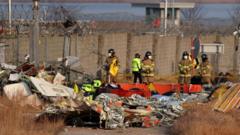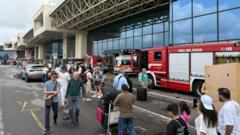On Sunday, January 1, a Jeju Air Boeing 737-800 crashed while attempting to land at Muan International Airport, leading to the loss of 179 lives, all passengers and crew members onboard. The aircraft was returning from Bangkok, Thailand with 181 individuals aboard when it reportedly collided with a bird and faced severe weather conditions just before landing. Video footage captured the plane coming off the runway, hitting a barrier and igniting upon impact. The aviation tragedy marks the deadliest in South Korea's history, prompting a comprehensive investigation to understand the crash's cause.
Fatal Jeju Air Crash in South Korea: Investigations Underway

Fatal Jeju Air Crash in South Korea: Investigations Underway
A tragic plane crash in South Korea has left at least 179 dead as authorities probe potential causes.
The flight, 7C2216, was approaching the runway when air traffic control issued warnings about bird activity. Moments after, the pilot declared an emergency due to a suspected bird strike and attempted to abort the landing. Just two minutes later, the plane touched down without deploying its landing gear, skidded off the runway, and crashed into a wall, resulting in a catastrophic fire. Rescue efforts saw two survivors pulled from the wreckage soon after the incident.
Fire officials pointed to a bird strike and adverse weather as critical factors, but investigations are ongoing to pinpoint the exact cause. Experts remain skeptical that a bird strike alone could lead to such a disaster, as similar incidents seldom result in catastrophic outcomes. Authorities have retrieved the flight data and voice recorders, but damage to the black box may complicate the investigation process.
With 179 confirmed casualties, consisting mainly of South Korean passengers, the tragedy has shocked the nation. Many victims were returning from holiday celebrations in Thailand. The South Korean government has declared the crash site a disaster zone, enabling emergency funds to aid recovery and victim identification efforts. Mourners have gathered at Muan Airport, mourning the loss of their loved ones during this national period of mourning.
In light of the disaster, South Korea's acting president has mandated a safety inspection across the airline industry, focusing on ensuring thorough adherence to safety protocols amid heightened scrutiny following the tragic event. Jeju Air has expressed their condolences to the victims' families and stated that they maintain a strong safety record since their establishment.
As the investigation continues, the aviation community watches closely, hoping critical lessons can be learned from this horrific incident.
Fire officials pointed to a bird strike and adverse weather as critical factors, but investigations are ongoing to pinpoint the exact cause. Experts remain skeptical that a bird strike alone could lead to such a disaster, as similar incidents seldom result in catastrophic outcomes. Authorities have retrieved the flight data and voice recorders, but damage to the black box may complicate the investigation process.
With 179 confirmed casualties, consisting mainly of South Korean passengers, the tragedy has shocked the nation. Many victims were returning from holiday celebrations in Thailand. The South Korean government has declared the crash site a disaster zone, enabling emergency funds to aid recovery and victim identification efforts. Mourners have gathered at Muan Airport, mourning the loss of their loved ones during this national period of mourning.
In light of the disaster, South Korea's acting president has mandated a safety inspection across the airline industry, focusing on ensuring thorough adherence to safety protocols amid heightened scrutiny following the tragic event. Jeju Air has expressed their condolences to the victims' families and stated that they maintain a strong safety record since their establishment.
As the investigation continues, the aviation community watches closely, hoping critical lessons can be learned from this horrific incident.



















